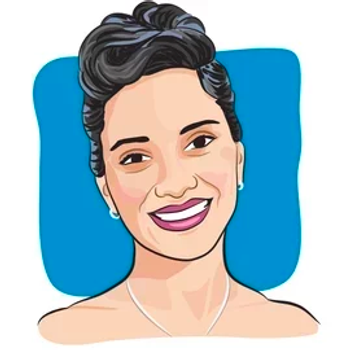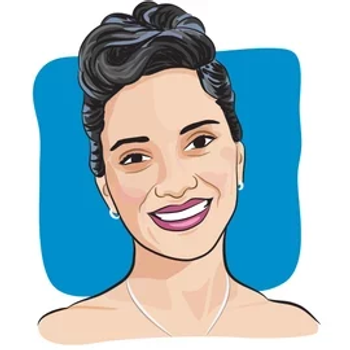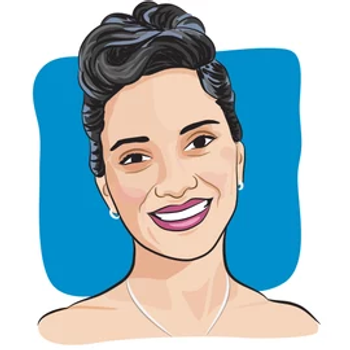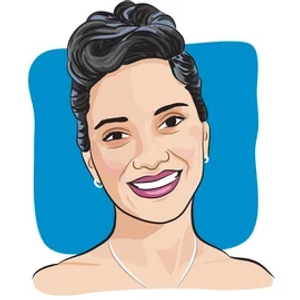
A brain tumor survivor explains how she chooses to approach life with acceptance of the hard times rather than trying to throw them away.

Samira Rajabi was diagnosed with a vestibular schwannoma, also known as an acoustic neuroma in 2012. She has had ten surgeries to deal with her tumor and its various side effects. She writes a blog about her life, surgeries, recovery and experiences at LivingWithHerbert.com. She is currently a post-doctoral fellow at the Center for Advanced Research in Global Communication at the University of Pennsylvania, where she studies media studies. In her spare time she plays with her two pups and spends time with her husband exploring Philadelphia.

A brain tumor survivor explains how she chooses to approach life with acceptance of the hard times rather than trying to throw them away.

A brain tumor survivor’s recent onslaught of symptoms caused her to reach out to her neurosurgeon for reassurance that nothing was wrong. An immediate response to bring her in for an MRI caused her heart to sink.

A major diagnosis often forces us to shift the way we approach our lives, even once we’ve survived. So, what does it look like to chart a future having suffered in the past? And, how might we look forward?

At the best of times, cancer is a difficult burden to bear, but in the midst of a pandemic, it's especially worse. But patients with cancer know the way out is by going through.

"I’m trying to turn my season of yes into a season of consideration. A season in which I weigh what I can do, with what I’d like to do, and with a radical honesty with my community around what that means and what a low-impact, beautiful, accepting, good life looks like. I hope that season lasts for a long time."

"It would be hard to be a family member of someone with cancer without worrying, but what does it mean to worry, and does our worrying mean we are coping?"

Carrying chronic illness can be very difficult, but there are ways to navigate the world without being crushed by the weight of what we cannot control.

For those of us living in the wake of a big diagnosis, how we define life, living and every day can be clouded by fear and misguided ideas of what it means to truly live. What I’ve learned is that life is not about what we are doing, but why and how we do what we have to for however long we get to be alive.

When a diagnosis begins to improve, it is hard to reconcile your identity as a patient with your identity as a whole. Grappling with questions of who you are after having been diagnosed with something life altering can be both profound and challenging, and leave you a bit, well, ambivalent.

Once you or someone you love has been diagnosed with something big, the times between scans become sacred in-between times where you do your best to live in light of the ever-changing circumstances of your body. Sometimes that can be a time full of fear, but others it is a time full of hope.

Health care shouldn't be a fight, but it is. I tell my story of fighting for an MRI in a hope that I illuminate the cracks in our system in a hope we can make change, so no one falls through those cracks.

My heart seeks joy. My life is joyful, full of light. And I know trauma can live in the light, I have seen it and lived it.

When my mom got cancer, the last thing on my mind was my own health, but she had the foresight and the care to get a genetic test so that her kids could live long and healthy lives. Today I am grateful for my mom, my whole family and the magic of science.

The ways life hits us with various challenges is neither fair nor fun, but we can still find happiness.

Chronic illness causes a lot of pain, and pain always carries fear with it. One way to cope is to recognize that fear can co-exist with many other feelings. It is OK to be scared, and it is OK to keep going.

For those of us living with (and taking care of) people living with brain tumors, cancers and other diseases that become chronic, life's challenges begin to shift, as do our outlooks. It is important for us to be able to love our bodies, our disabilities, and for the world to make space for all sorts of bodies to exist.

When stuck in this space, it is tempting to hide from life, but with all the beauty in the world, it doesn't serve any of us to hide.

It's hard to stop comparing our sick bodies to the people around us, but once we do, as both patients and caretakers, we learn to honor our own experiences and value ourselves in new and beautiful ways.

When our bodies have experienced trauma, it is so easy to live in fear of what else may go wrong. But accepting that we don't know what will happen to us also means accepting that the worst is not always inevitable. Sometimes, despite our fears, we still thrive, and that is a reason to recognize that even if you've suffered, you can still be OK.

Those of us who have suffered often fear what can go wrong with them. But the more we know our bodies, the more we can love them and ourselves.

Every six months, I get an MRI to check for recurrence or growth of my brain tumor. This is one of those times. To prepare for tomorrow, I try to remember not to forgo today.

Moving with a health problem comes with the logistical challenge of finding resources in a new place which is a task conquered through patience, kindness and a lot of organization.

There are so many ideas of what it is to be strong, but what if strength lies in being honest, being vulnerable and being ourselves?

We all deal with pain. For some of us, it is chronic, but we can't give up. Pain can be a tricky partner to walk along side and is different for everyone. For me, I must face it. I must try to heal it, and I must try to take steps forward, no matter how tiny they may be.

It can be hard to name our fears, especially when we are worried that others don't share them or that they will make us feel like a part of our community. In sharing, we can name stressors, activate healing from those stressors and give our bodies a chance to cope with all that has happened to us.

Recovery is an up-and-down process, and it's okay to show yourself compassion through the ups and the downs.

After any kind of health trauma, even the good news comes with an air of skepticism, caution and even fear. That said, there's a reason to celebrate any day we get to live and argue in favor of faith and hope, not fear.

Sometimes it seems like being heroic after you get sick is expected of you. To me, putting goodness into the world, in sickness or in health, is what makes heroes.

There is no right way to deal with the various crises life throws our way, so we try to make sense of them and love through it and live, despite the inevitability of our existence.

No follow-up scan is easy, but some feel routine. When they don't, we have no choice as survivors but to face our fears and move forward, one step at a time, one scan at a time.

Published: February 25th 2021 | Updated:

Published: November 15th 2016 | Updated:

Published: November 29th 2016 | Updated:

Published: May 17th 2017 | Updated:

Published: August 23rd 2017 | Updated:

Published: September 11th 2017 | Updated: